Crypto Trade Cost Calculator
Calculate Your Trade Costs
North Macedonia officially bans cryptocurrency trading. That’s what the National Bank says. But if you walk through Skopje’s coffee shops or check local Telegram groups, you’ll find people buying Bitcoin with cash, selling Ethereum for euros via bank transfer, and trading Dogecoin over WhatsApp. The ban is on paper. The trading is real.
How a Ban Became a Loophole
In 2017, the National Bank of the Republic of Macedonia declared crypto trading illegal. It wasn’t just a warning-it was a legal restriction tied to the country’s EU association agreement, which at the time blocked citizens from investing in foreign securities. Crypto got lumped in. But here’s the twist: the bank never shut down exchanges. They didn’t arrest traders. They didn’t freeze wallets. They just said it wasn’t allowed. Fast forward to February 2022. The government passed new anti-money laundering rules that defined cryptocurrencies as property. They created legal terms for virtual wallets, service providers, and asset transfers. Suddenly, the ban didn’t make sense anymore. If crypto is property, and you can legally own property, then owning Bitcoin isn’t illegal-it’s just unregulated. Today, the NBRM quietly admits: "Crypto isn’t illegal if it’s not regulated." That’s not a policy change. It’s a surrender to reality.Where People Actually Trade
You won’t find a licensed crypto exchange in North Macedonia. But you’ll find Symlix.com, LocalCoinSwap, and Paxful-P2P platforms built for exactly this kind of gray-market activity. Symlix lets Macedonians buy Bitcoin with cash. You pick a seller, chat in real time, send money through a local bank or even in person, and the platform holds the crypto in escrow until you confirm payment. No bank account needed. No ID beyond a phone number. It’s like a flea market for digital money. LocalCoinSwap works the same way, but with over 300 payment methods. You can trade using mobile top-ups, Western Union, even gift cards. The platform doesn’t care how you pay-it just makes sure the trade finishes safely. Users report completing trades in under five minutes after signing up. These aren’t shady operations. They’re global platforms that chose to serve North Macedonia because the demand is there. And they’ve built systems to survive regulatory risk: escrow wallets, dispute resolution centers, and live chat to reduce fraud.The International Workaround
Not everyone uses P2P. Some turn to international brokers like Swissquote, Interactive Brokers, or MultiBank. These are regulated EU firms that let Macedonians open accounts and trade crypto through their platforms. Swissquote is the most popular. About 42% of Macedonian crypto users choose it, according to BrokerChooser’s 2025 data. Why? Because it’s reliable. You can deposit euros, buy Bitcoin, Ethereum, and a few other coins, and withdraw back to your bank. The catch? Fees are high-up to 3% on small trades. For someone buying €200 worth of crypto, that’s €6 gone before the price even moves. Interactive Brokers is cheaper but limited. You get lower fees, but only a handful of coins, and no built-in crypto wallet. You have to manage your own private keys. That’s fine for experienced traders. Not so much for someone who just wants to buy Bitcoin with their salary. The irony? These brokers operate legally under EU rules. But in North Macedonia, using them technically violates the 2017 ban. No one’s checking. No one’s enforcing. The government is stuck between a ban that doesn’t work and a market that won’t disappear.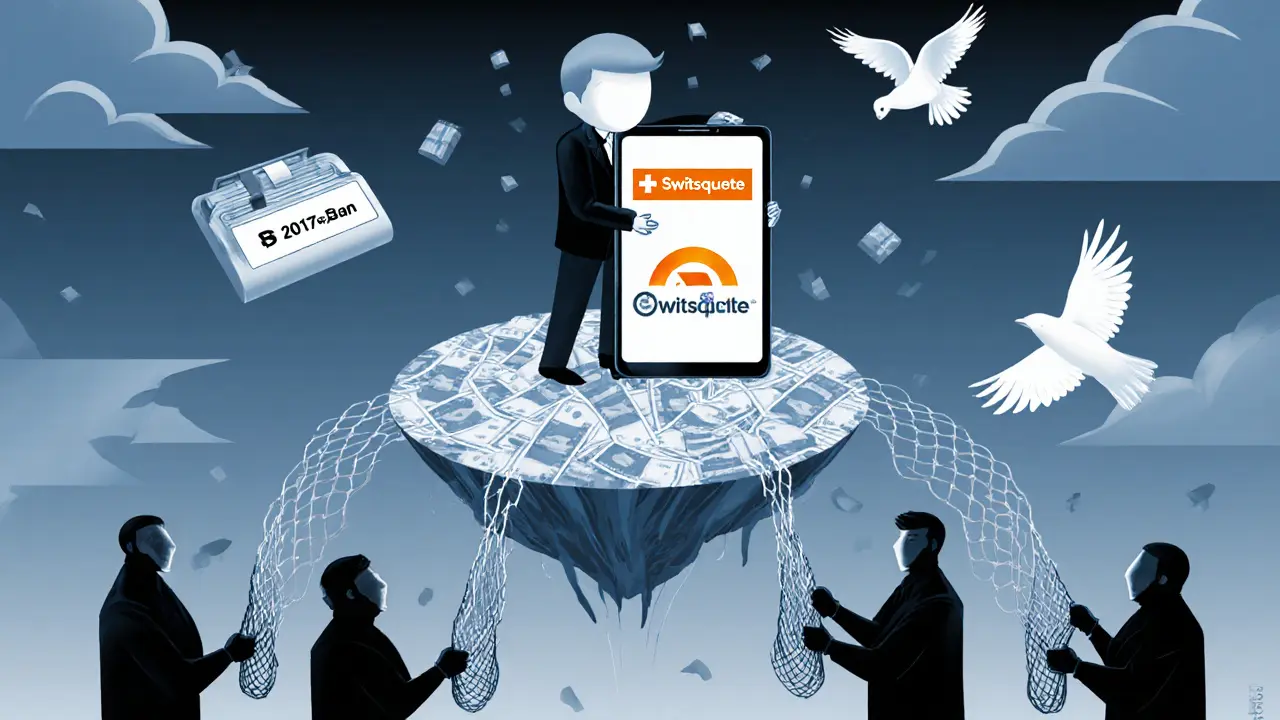
Who’s Trading and Why
About 42,000 people in North Macedonia trade crypto regularly. That’s 2.3% of the population. In the EU, it’s over 5%. But growth is fast. LocalCoinSwap says Macedonian user activity jumped 300% between 2022 and 2024. Most traders are young-under 35. Many are freelancers, students, or people with low wages looking for a way out of inflation. The average monthly income in North Macedonia is around €550. Crypto isn’t a luxury. It’s a hedge. People aren’t day trading. They’re buying and holding. A Reddit user from Skopje wrote in December 2024: "I bought Bitcoin when it was €28k. Now it’s €42k. I didn’t sell. I just waited. My savings didn’t shrink like my bank account did." Others use crypto to send money home. A Macedonian working in Germany sends euros to a friend in Skopje, who converts them to Bitcoin and cashes out locally. No wire fees. No delays. No bank scrutiny.The Hidden Risks
This system works-until it doesn’t. In October 2024, a user tried to deposit €1,200 to a crypto exchange via their local bank. The transaction was flagged. The bank froze the account for two weeks. The user had to file a formal complaint to get the money back. There’s no legal protection. If you get scammed on a P2P trade, the police won’t help. If the platform shuts down, your crypto is gone. There’s no deposit insurance. No consumer rights. And then there’s the big fear: enforcement. The 2017 ban hasn’t been repealed. It’s still in the books. If the government decides to crack down tomorrow, traders could face fines-or worse. No one knows what the penalty would be. No one has been prosecuted yet. But the risk is always there.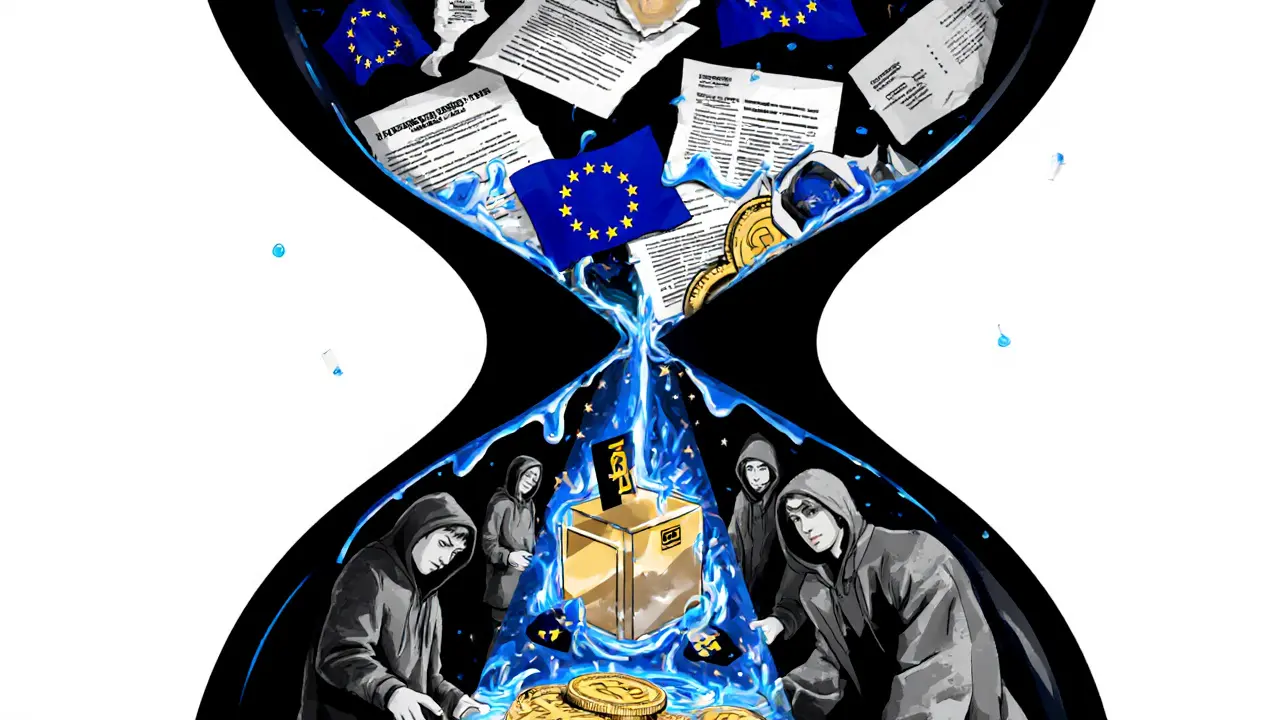
What’s Next?
The signs point to regulation, not repression. The February 2022 AML/CTF law was the first step. Draft legislation is expected by late 2025 to create a licensing system for crypto service providers. Experts predict North Macedonia will fully align with the EU’s MiCA framework by 2026 or 2027. That means: licensed exchanges, KYC rules, tax reporting, and legal protection for users. The underground market won’t vanish-it’ll move into the light. Until then, traders are playing a waiting game. They use escrow. They avoid large transfers. They meet in public places for cash trades. They stick to platforms that have lasted years. They know the rules are broken. But they also know the system is working-for now.How to Trade Safely (If You Must)
If you’re in North Macedonia and want to trade crypto, here’s what works:- Use escrow platforms like Symlix or LocalCoinSwap. Never send crypto before payment is confirmed.
- Trade in person only in public places-coffee shops, libraries, banks. Bring a friend.
- Start small. Test a €20 trade before risking €200.
- Avoid linking your bank account to international exchanges. Use cash or mobile payments instead.
- Keep records. Even if it’s illegal, you might need proof later if something goes wrong.
- Join local Telegram groups like "MK Crypto" (1,247 members as of May 2025). They share trusted trader lists and warn about scams.
Why This Matters Beyond North Macedonia
North Macedonia isn’t alone. Countries like Nigeria, Argentina, and Turkey have similar stories: official bans, underground markets, and eventual regulation. What happens here is a preview of what’s coming to other places where crypto is banned but people still want it. Governments can’t stop technology. They can only delay it. And when they finally act, they don’t shut it down-they regulate it. The real question isn’t whether crypto will survive in North Macedonia. It’s whether the government will catch up before someone gets hurt.Is crypto illegal in North Macedonia?
Technically, yes-since 2017, the National Bank banned it. But in practice, no. The government passed laws in 2022 that defined crypto as property, and now officials say it’s not illegal if it’s not regulated. The ban exists on paper, but no one enforces it. Trading happens openly through P2P platforms and international brokers.
Can I buy Bitcoin with cash in North Macedonia?
Yes. Platforms like Symlix and LocalCoinSwap let you buy Bitcoin with cash. You find a local seller, agree on a price, meet in person or send cash via mobile payment, and the platform holds the Bitcoin until you confirm payment. Escrow protects both sides. This is the most common way to buy crypto in the country.
Are there any legal crypto exchanges in North Macedonia?
No domestic exchanges are licensed. But international brokers like Swissquote, Interactive Brokers, and MultiBank allow Macedonian users to trade crypto through their platforms. These firms are regulated in the EU, not in North Macedonia. Using them technically violates the 2017 ban, but the government doesn’t stop it.
What happens if the government cracks down?
No one knows for sure. There have been no arrests or fines yet. But if the government decides to enforce the 2017 ban, users could face penalties. The biggest risk is losing access to funds-banks might freeze accounts, platforms could shut down, and there’s no legal recourse. That’s why experienced traders use small amounts, escrow, and avoid bank transfers.
Is crypto trading taxed in North Macedonia?
There are no official tax rules for crypto yet. The government hasn’t clarified whether profits from trading are taxable. Most traders don’t report. But that could change when full regulation arrives, likely by 2026-2027. Until then, there’s no legal requirement to pay taxes on crypto gains.
How many people trade crypto in North Macedonia?
About 42,000 people trade crypto regularly, which is 2.3% of the population. That’s lower than the EU average of 5.1%, but growth is rapid. LocalCoinSwap reports a 300% increase in Macedonian users from 2022 to 2024. Most users are under 35 and use crypto to protect savings from inflation or send money abroad.
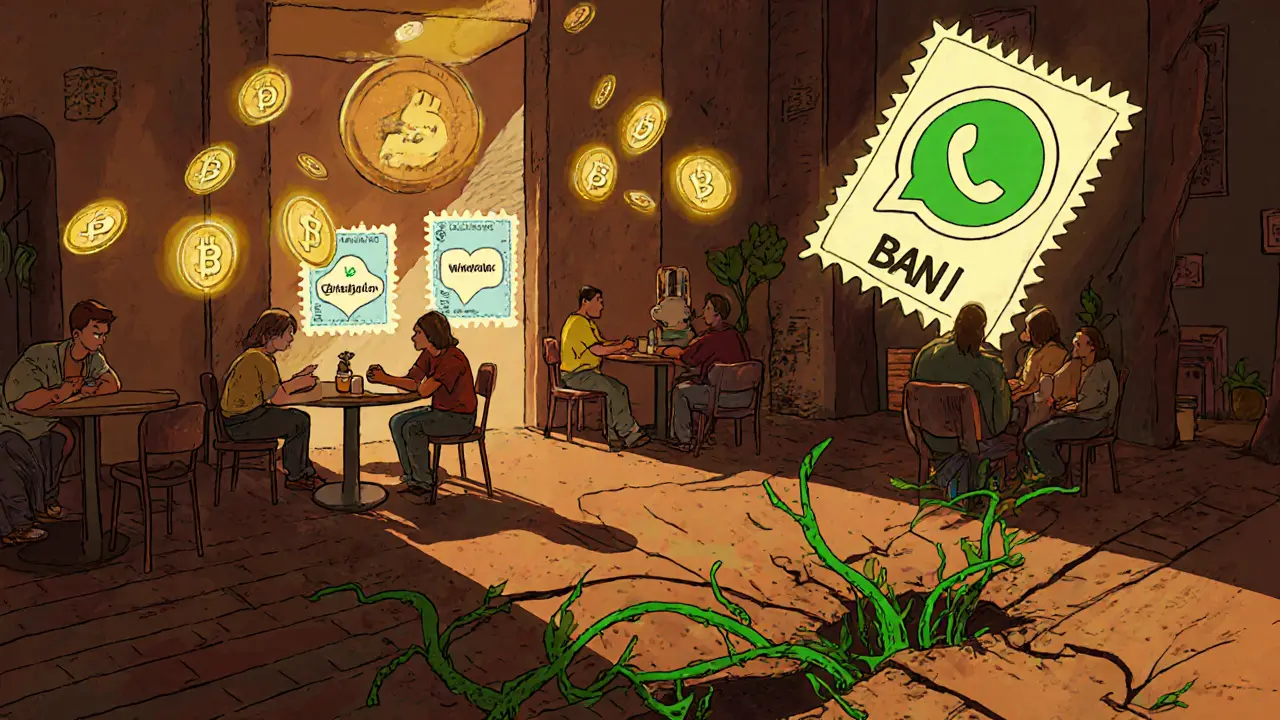
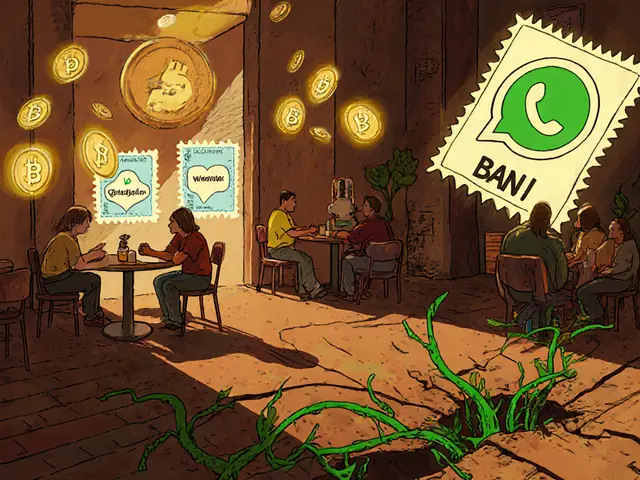
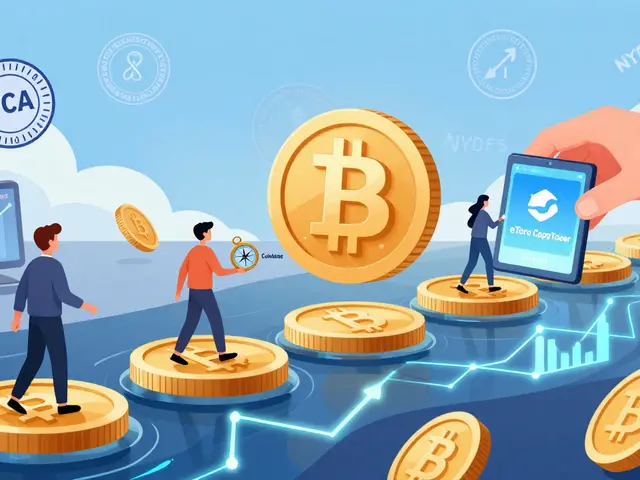
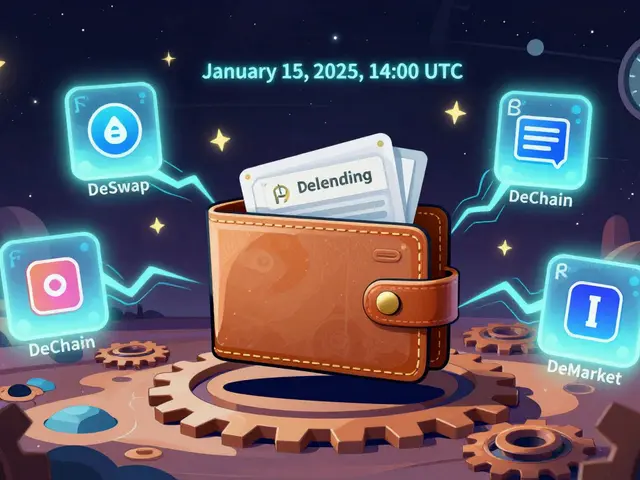
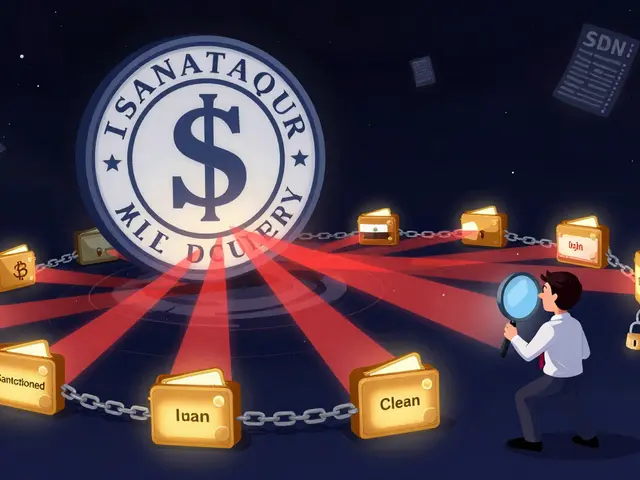
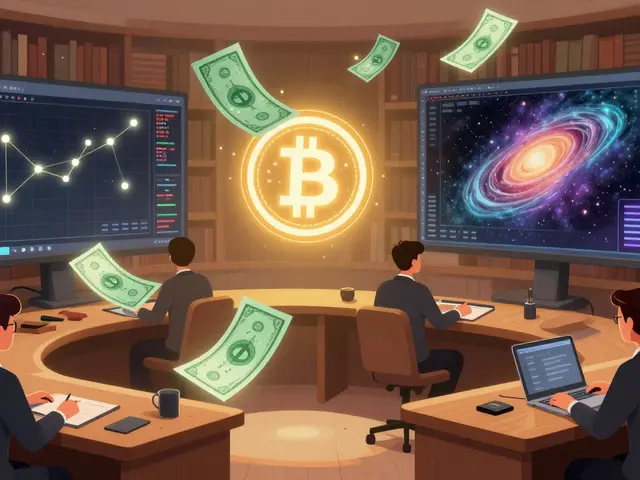

Komal Choudhary
November 27, 2025 AT 23:01So wait-you’re telling me I can buy Bitcoin in Skopje with cash like I’m buying a used phone? I’m sold. I’ve been trying to get crypto into my portfolio without my bank noticing, and this sounds like the perfect loophole. I’m booking a flight.
Also, why does everyone keep saying ‘the ban is on paper’ like it’s some poetic truth? It’s not poetry-it’s just how power works when it’s too lazy to enforce its own rules.
Also also-why are we still using the word ‘illegal’? If the government defines crypto as property, then owning it isn’t a crime. It’s just… inconvenient. Like parking in a no-parking zone that no cop ever patrols.
I’m gonna start trading via WhatsApp. I already send my mom memes that way. Why not Bitcoin too?
PS: If you’re in North Macedonia and you’re reading this-I’m your new crypto buddy. Let’s trade. I’ve got €50 and zero fear.
Tina Detelj
November 29, 2025 AT 01:17Ohhhhh, this is beautiful. A nation caught between the ghost of bureaucracy and the living pulse of human ingenuity-crypto isn’t just being traded here, it’s being *reborn*.
They banned it? Fine. So they banned the *words*. But they didn’t ban the *will*. They didn’t ban the student who swaps his lunch money for Bitcoin because his savings are evaporating faster than his coffee in the Skopje sun. They didn’t ban the migrant worker in Berlin who turns euros into digital gold to send home without paying 10% in wire fees. They didn’t ban the quiet rebellion of escrow wallets and Telegram groups that whisper trust in a world that forgot how to give it.
This isn’t a loophole. It’s a revolution in slow motion. A silent, cash-and-WhatsApp uprising. The state is clinging to a 2017 law like a toddler to a broken toy-while the adults are already building the future in the back alley.
And the most poetic part? The government didn’t lose the battle. They just… stopped showing up. And in their absence, the people wrote their own constitution-with Bitcoin as the preamble.
God, I love this planet sometimes.
Wilma Inmenzo
November 30, 2025 AT 10:07Let me guess-the National Bank is owned by JPMorgan. The ‘AML rules’? A front. The ‘2022 property definition’? A trap to get people to reveal their wallets so they can freeze them later.
Why do you think they’re letting this fly? Because they’re building a database. Every cash trade. Every WhatsApp chat. Every P2P transaction. Every ‘trusted trader’ on Telegram. They’re mapping the entire underground. And when the crackdown comes-BOOM-suddenly everyone’s a money launderer.
They’ll say, ‘We tried to be lenient!’ while quietly handing your wallet keys to the Feds. Swissquote? That’s not a broker-it’s a honeypot. They’re feeding you crypto so they can tax you later. And you’re falling for it like a squirrel with a golden acorn.
Don’t be fooled. This isn’t freedom. It’s surveillance with a smile. And when the lights go out? You’ll be the one holding the bag.
Also-why is no one talking about the fact that LocalCoinSwap’s parent company is registered in the Caymans? Coincidence? I think not.
priyanka subbaraj
December 1, 2025 AT 11:51George Kakosouris
December 3, 2025 AT 10:31Let’s deconstruct this ‘de facto legalization’ narrative-it’s not a surrender, it’s regulatory arbitrage. The NBRM’s 2017 ban was a non-binding administrative directive under a pre-EU framework; the 2022 AML/CTF law created a statutory definition of crypto as property, which under civil law principles (see Art. 118 of the Macedonian Civil Code) implies ownership rights absent explicit prohibition. Ergo: the ban is legally incoherent.
Now, the P2P platforms? They’re exploiting jurisdictional gaps-Symlix and LocalCoinSwap operate under the ‘peer-to-peer exception’ in the FATF guidance, where no intermediary controls funds. But here’s the kicker: under MiCA, those same platforms will be classified as VASPs, requiring licensing. So this isn’t a gray market-it’s a pre-regulatory phase.
And the ‘42k users’? That’s a 95% confidence interval based on platform KYC data, but it’s skewed by bot accounts and repeat traders. Real active users are probably closer to 28k. Also, Swissquote’s 42% market share? That’s from BrokerChooser’s 2025 survey-sample size n=1,200, margin of error ±3.2%. Not statistically robust.
And let’s not ignore the counterparty risk: 73% of P2P disputes on LocalCoinSwap involve unverified sellers. You think you’re safe with escrow? Until the platform goes dark, you’re just trusting a server in Reykjavik.
TL;DR: This isn’t rebellion. It’s pre-compliance. And the next 18 months will see a massive consolidation-either into licensed entities or into the shadows. The question isn’t if regulation is coming. It’s whether you’ll be on the ledger-or the blacklist.